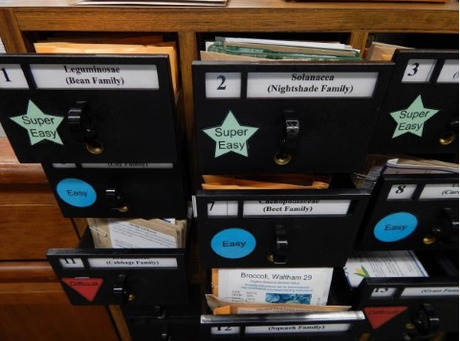A Pennsylvania seed library stands accused of ‘agri-terrorism’ over alleged breaches of the Seed Act 2004

Agri-Terrorism
by Kevin Carson/ The Ecologist
According to a recent story at Shareable by Kelly McCartney and Sarah Baird (‘Pennsylvania Seed Library Investigated by Department of Agriculture‘), the Pennsylvania Department of Agriculture is investigating an heirloom seed library for possible “agri-terrorism”.
Libraries for sharing traditional and heirloom seed varieties are a growing phenomenon nationwide, intended as a way to preserve biodiversity and the collective heritage of many millions of hours of selective breeding against the lockdown a handful of giant agribusiness corporations has imposed on our entire food chain.
A public library in Mechanicsburg, Pennsylvania celebrated Earth Day this year by launching its own seed library project. This didn’t sit well with the state Ag Department, which is investigating the seed library, citing possible violations of the Seed Act of 2004.
Violating the Seed Act 2004
As the Shareable article recounts, “Back on April 26, the Joseph T. Simpson Public Library in Mechanicsburg, Pennsylvania, launched their own seed library as part of the local Earth Day Festival.
“Several programs were already scattered across Pennsylvania and the library did their due diligence prior to launching, working with both the Cumberland County Commission for Women and the local Penn State Agriculture Extension.
“After gathering up organic heirloom seed varieties from Seed Savers, the seed library quickly attracted 60 members, and was looking forward to expanding.
“This all changed in June, when library officials received a letter from the Pennsylvania Department of Agriculture notifying them that their seed library was in violation of the Seed Act of 2004. The Department of Agriculture sent a top official and attorneys to meet with library representatives.
‘Agri-terrorism is a very, very real scenario.’
The department’s duties, under the terms of the Act, include “keeping mislabeled seeds, invasive plant species, cross-pollinated varietals, and poisonous plants out of the state.”
Pursuant to that authority, the department told the library, “all seeds had to be tested for purity and germination rates.” A Cumberland County commissioner explained, presumably with a straight face:
“Agri-terrorism is a very, very real scenario. Protecting and maintaining the food sources of America is an overwhelming challenge … so you’ve got agri-tourism on one side and agri-terrorism on the other … “
According to the librarian in charge of the seed program, the library can meet the state’s demands for demonstrating the purity and germination rates of its seeds with a few simple steps:
“We can only have current-year seeds … and they have to be store-purchased because those seeds have gone through purity and germination rate testing. People can’t donate their own seeds because we can’t test them as required by the Seed Act.
“Also, when people contribute, they usually just bring a handful of seeds. The purity and germination rate tests take several hundred seeds, so we don’t even have enough to test.”
So that’s alright then
So heirloom seed libraries are just fine as long as the seeds are obtained through commercial distributors and no seeds from previous years are involved.
Hmmm … If I didn’t know better, I’d think the state regulations were custom tailored to criminalize circumventing corporate agribusiness’s monopoly on the entire food chain. Purely coincidental, I’m sure.
It’s also odd what doesn’t count as one of the forms of “agri-terrorism” the Seed Act is supposed to protect us against.
For all its concerns about mislabeled seeds and cross-pollinated varietals, the Pennsylvania State Agriculture Department is remarkably unconcerned with things like, say, farmers having their heirloom crops contaminated by pollen from Monsanto’s genetically modified seeds (including the so-called ‘terminator gene’, designed to produce sterile offspring so farmers can’t save seed).
Corporate strong arm tactics
Worse yet, it’s unconcerned with Monstanto’s further terroristic practices, like sending out Pinkerton goons (yeah, those Pinkertons – the armed mercenaries who used to fight pitched battles against striking workers) to harass farmers whose crops are contaminated for “stealing” Monsanto’s patented genetic material.
That’s like suing someone you shot for stealing your bullets. Monsanto also threatens and strong arms grocers who label milk with and without recombinant bovine growth hormone (rBGH), on the grounds that free commercial speech is “product disparagement”.
Pennsylvania’s state government carries out actions of its own that some would regard as terroristic, like sending out (at the behalf of chain grocers) agents to set up sting and entrapment operations to shut down Amish farmers’ membership-based food buying clubs, and sending SWAT teams to terrorize sellers of raw milk.
The agribusiness crime syndicate?
Since their beginnings, the USDA and state departments of agriculture have heavily subsidized, and acted as the enforcement arm of, the corporate agribusiness crime syndicate, terrorizing people who presume to feed themselves without paying tribute to their corporate crime lords.
If, as the late Major General Smedley Butler said, the US Marines were the overseas strong arm operation for the big US banks, then the USDA and Pennsylvania DA are strongarm operations for Monsanto, Cargill and ADM.

